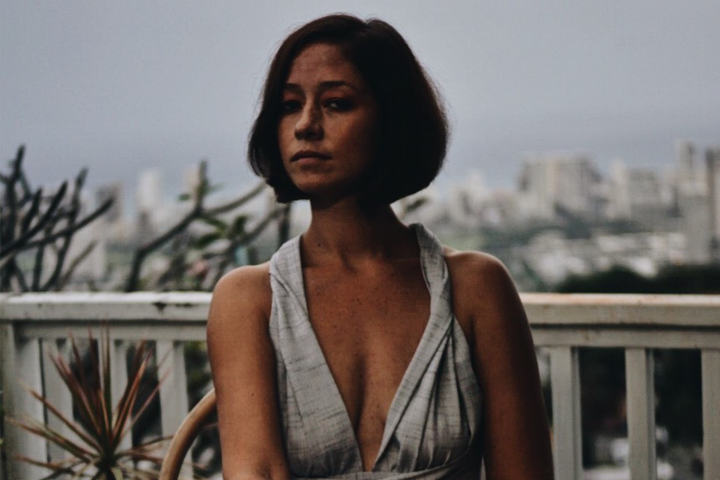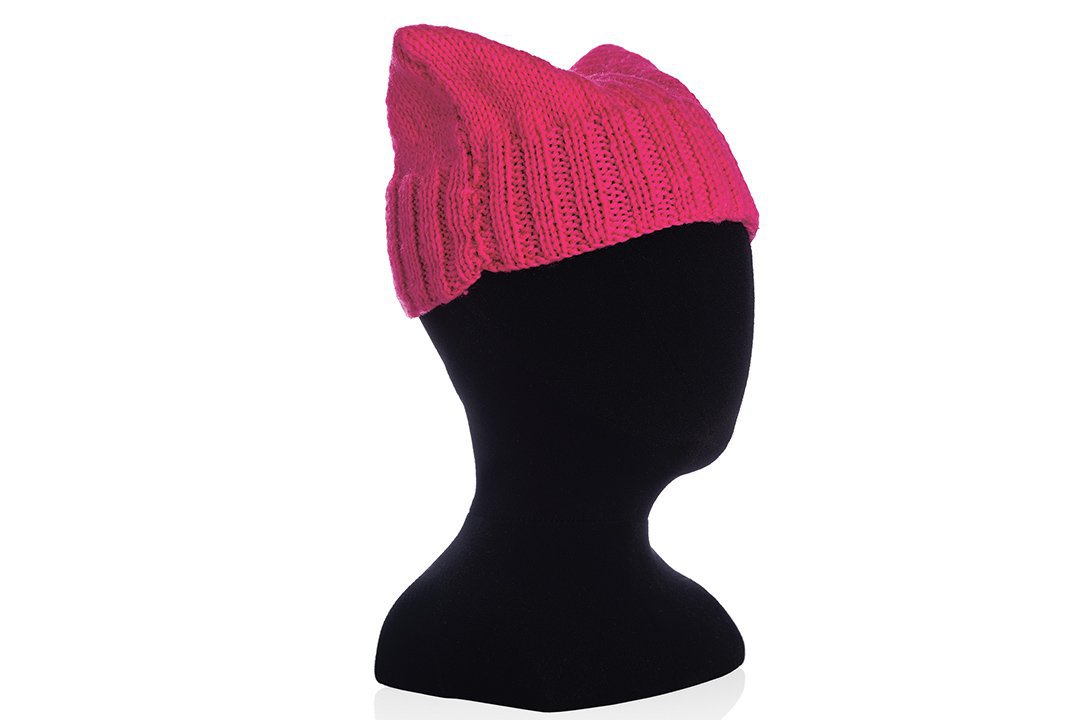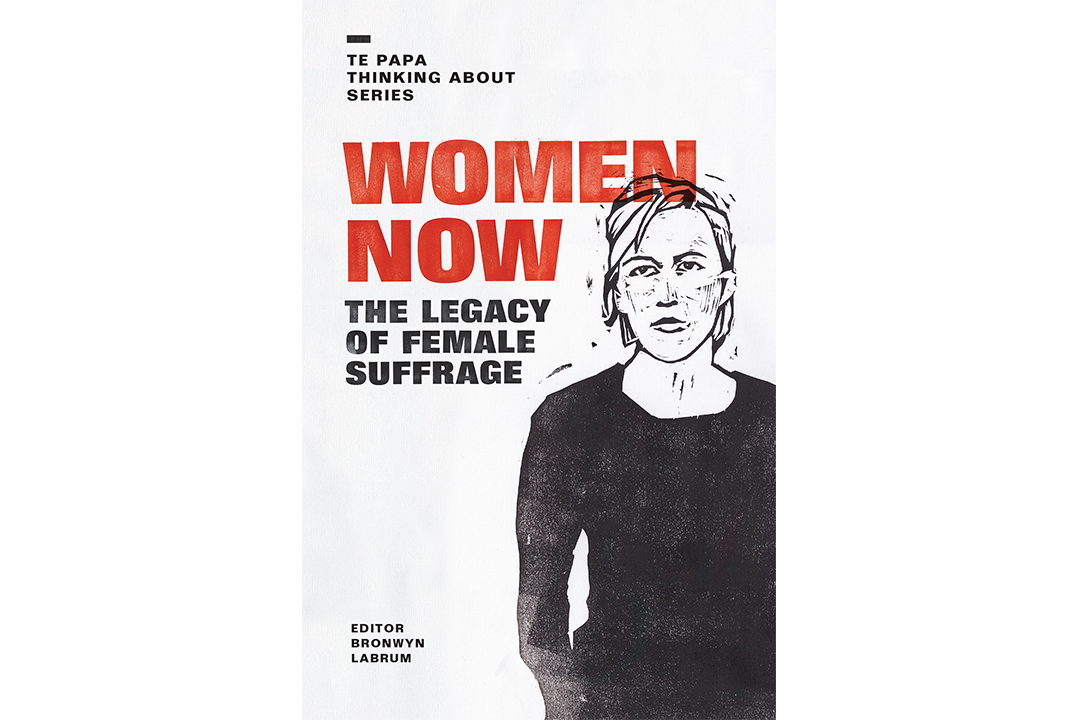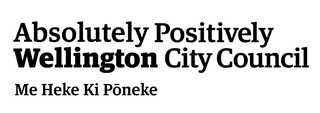Grace Taylor • 19 September 2018
In this exclusive extract from Women Now: The Legacy of Female Suffrage, Grace Taylor reflects on Te Papa's Pussyhat, on display at Te Papa's pop-up exhibition Doing It for Themselves: Women Fight for Equality – on now until the end of February.

Extracted with permission from Women Now: The Legacy of Female Suffrage, edited by Bronwyn Labrum and published by Te Papa Press, $35.
untitled
P U S S Y
PUSSY
here pussy pussy
come get this pussy
puss — hey!
puss — aye?
puss — hey — oohh — hip hop hooray — hoe
— hoe?
‘grab her by the pussy’
what the fuck?
no … I meant a metaphorical pussy!
like pussy as in … weak,
like pussy as in … I’m the boss,
like pussy as in … less than
man,
like pussy as in …
a pussy that can stretch and bring life into this world?
mutha fucka, my pussy isn’t yours to grab
hold up, I don’t have a pussy and I give life
she gives life
pussy is reclaiming
is empowerment
pussy is middle finger up in the air
is …
let’s make hats!
pink hats
pink pussy hats
let’s knit pink pussy hats
domesticated fuck yous
like proud and loud knitted protests
let’s march
in thousands
in pink pussy hats — domesticated fuck you thousands
and smile when we do it
my pussy was grabbed
by uncle
by that guy in the club
by my husband after an argument
was played with and torn
your pussy hat protests trigger my hurt
my pussy is an aesthetic
is me being who I really am
my pussy is gentle
and sweating my femininity
pussy is diverse
is changing
is undefined
but is MY pussy YOUR protest?
 Pussy hat made by Erin Kennedy 2017 and gifted by her to Te Papa 2017
Pussy hat made by Erin Kennedy 2017 and gifted by her to Te Papa 2017
–
My name is Grace Teuila Evelyn Taylor. I am a cis female (a term that, truthfully, I only just learned in the last year), a woman, a mother, a sister, a daughter of English, Samoan and Japanese descent thriving and living in diaspora within the land I call home, Aotearoa. I also identify as a poet, a youth worker, a single mother, an activist through love, a teaching artist and a mentor. At the core of all of this, I am a creature of observation and expression.
When I think of the one hundred and twenty-fifth anniversary year of women’s suffrage in New Zealand, I think of myself in relation to my knowledge of the history of this movement and how it relates to me in the present. I also think about my mother’s generation, Samoan women migrating to Aotearoa seeking a better life and more opportunities in the 1970s. Did feminism impact positively on them? If so, at what cost? Was it fair in comparison to other women in their workplace of different cultural backgrounds? Was it really freedom to work a 60-hour week while still being the ever-present 24/7 mother? Was it freedom to receive awkward stares when breastfeeding their fair-skinned mixed-race children in public? This is how I begin to think about feminism first, in relation to the women in my genealogy.
–
I will be honest: I had no idea what the heck the pussy hat was.
Naturally I turned to Google. Articles of support and criticism were not hard to find at all, the diversity of opinions was rich, and my ‘afakasi (transliteration of half-caste in Samoan) nature’ made me jump from agreeing with one perspective to another. The more I read, the more I fell down a rabbit hole of feminist politics. I started to wonder: Can there exist a true balance between accountability and empowerment within feminism?
My Google search led me to the website of the creators of the Pussyhat Project. They say: ‘The name Pussyhat was chosen in part as a protest against vulgar comments Donald Trump made about the freedom he felt to grab women’s genitals, to de-stigmatize the word “pussy” and transform it into one of empowerment, and to highlight the design of the hat’s “pussycat ears”. Yet as I read through their history and purpose and their media releases something made me feel uncomfortable. The creators of the pussy hat had good intentions, but the exclusivity in choosing a pink pussy hat as the symbol of empowerment to elevate women’s rights and the commodification of our body parts speaks of exclusivity to me. I know it can be an act of claiming back, but what about those who identify as female not based on the physical? And why does it have to be pink? What is the purpose of assigning a colour to a gender? It feels like quite a step back in history.
The website also notes, ‘The Pussyhat is a symbol of support and solidarity for women’s rights and political resistance.’ I asked my hearty feminist friends, ‘What do you think of the Pussyhat Project?’ I received mixed responses. I respect each of them and they all raised valid and grounded points. It was confusing, and I just could not get away from the topic of feminism. Am I a feminist? If so, am I feminist enough? What type of feminist am I?
How many types are there? What is our definition of woman? Am I woman enough to be feminist?
Traditional feminist Intersectional feminist
Socialist feminist
Pm and third-wave feminist
Lesbian feminist
Liberal feminist Radical feminist
Ecofeminist Fourth-wave feminist
Anarcha-feminist Indigenous feminist
Consumerist feminist Choice feminist
Third-world feminist
and so on
and so on
and so on.
Overwhelming — boxing and defining a supposed form of freedom into one labelled thing and then arguing amongst ourselves about the right type of feminist? Attached to these types of feminist is a checklist of what makes you ‘[x]-type feminist enough’. The feminist lens seemed to be mirroring the male lens we have grown up with and actively have to unlearn and oppose on a daily basis.
Judging, judging myself, falling into a pit of labels and anti this and pro that and ‘are you enough of?’ and ‘who will I piss off? and ‘will I say something wrong?’… that isn’t empowerment to me.
Is the discourse amongst feminists helpful? The sometimes hating-on between women about what and who is feminist — or even feminist enough?
what kind of feminist are you tho?
I liken to
yeah but, what kind of woman are you tho?
I liken to … WTF?
the categorising
and defining
and ‘are you enough of’
and ‘too mouthy of’
I ask myself,
why does this empowerment
feel so close to what we escaped from?
Feminism = fluid = freedom
to be exist evolve
it twists on the curl of my son’s eyelashes
soaks on the clothes I hang on the washing line
drinks from the bank account I use to pay my bills
tickles the laugh of my sisters
and opens its arms to my brothers
–
All of this left me with the question, what the heck is a feminist?
I remember the first time someone called me a feminist. It was 2010. I was a new mum and competing in a poetry slam. At that point, much of my poetry was about my identity as a mixed-race woman. However, at this slam I performed a poem called ‘Crown of Womanhood’, a poem about my experience of becoming a first-time mother. After the slam, one of the competing poets, a male friend, said, ‘I like your poetry, you’re a dope feminist poet,’ to which I replied, ‘I’m not a feminist.’ I remember getting quite angry with him. First, because he was boxing me in a specific ‘type of poet’ category, but also because I had an immediate sense of shock at being called a feminist, something I was not trying to be nor identified with intentionally. In my eyes, all I did was share my stories through poetry, my lived experiences and observations of the world around me as a woman. Was that feminist? What did/do I believe in? Equality for all. Was that … feminist?
Years later, I find myself wondering, why was I so quick to correct him? What was driving my reasons for feeling slightly offended? Why did feminist feel like a dirty word? Shit, was I that conditioned to a predominantly male lens back then? Perhaps it was because yet again a man was telling me what I was, marking my identity for me.
Perhaps it was my innate feminist defences responding to that marking? In recent years the combination of female empowerment, feminism and social media has provided a useful tool for voice and visibility for many women. But along with anything related to social media comes the power of a sort of hyper-projection of self. Many, myself included, have been focusing on discovering, embracing and expressing our inner goddess, connecting with our divinity and sacredness. Which is fierce, ugly and beautiful. But the social-media platform also creates a strange, slightly contrived sense of displaying your goddess.
goddess complex
goddess
god-less
gods-rest
less-god
gods-mess?
confess!
less
god
rest
goddess
I have done it too. Sometimes it has been authentic, sometimes it has been romanticised and at other times it has been a form of defence. Over the years I have played with the concept of goddess being a hyper-human-untouchable entity, but now my goddess journey lies amid doing the laundry, cooking a healthy dinner for my family or having a cup of tea with a friend (and not posting to Instagram about it). What I love about embracing your goddess is the focus on embracing your sacredness. That is something that would be good for anyone. To embrace your sacredness is to honour yourself, and if you can honour yourself, you can honour others. This is where my thoughts of feminism feel most comfortable.
Perhaps it evolves based on the state of our world at the time? The more I think about it, read about it, talk to other women about it, the more I believe there is no answer, and I like that. How dynamic and complex we are as women, as humans. And how fluid identity in general is. I like to think that feminism = freedom. Freedom to evolve, to adapt when required, to respond with urgency and love. To kick ass or open our arms when needed. To name and place ourselves for ourselves. Perhaps feminism can’t be defined collectively but rather is based on the individual.
I invited others to speak about their concept of feminism, and here is what they shared.
‘My feminism is intersectional and radical. Intersectional in that I approach the world through a gendered racial and class lens with the understanding that all oppression is interconnected. Radical in that I believe in transformative politics that dismantle, not reform, sexist, capitalist and racist imperial structures. And then to rebuild with equity and social justice at the foundation.’ — Hala Nasr
‘For me, it is the principle that I own my body, that I have a right to determine what goes into it, what happens to what comes out of it. It is leaning into the discomfort of knowing I have been taught by patriarchal, colonial and neoliberal-capitalist frames that I am not enough, and that most of the time I believe that fallacy. We Should All Be Feminists is an amazing book, bcos she ends up with, like, twenty qualifiers before the word ‘feminist’. I would say I am a present feminist over a perfect one. I am an embodied, white, cis, queer, bubbly, long-haired, pierced feminist. But Michel Foucault says, “Do not ask me who I am, and do not expect me to remain the same.” I like that.’ — Jess Holly Bates
‘Feminism is an opportunity for men to learn their privileges within our patriarchal society and call themselves out on how unfair the world they live in is and realise this, then influencing them into a new direction where they generate equal opportunities for all types of women — cis, trans and coloured. Feminism is just the right thing to do. Women are more than just our body parts and what society says our role in nature is. Feminism is about giving all women the freedom to live in a world where they can be their truth and their authentic selves, have equal opportunities and be safe. Isn’t that what we all want.’ — Jaycee
‘Feminism in the European sense had a bearing on my upbringing, especially from my Aunty Irene, who really made sure I was aware of the shortcomings of the male-centric world I was brought up in. All the women in my family were survivors despite the classical expectations of their role in society and the situations they all ended up in as solo mums during the ’70s, where we all lived together in one house. So it wasn’t the feminist movement as such that I was aware of but the incredibly enduring women who brought me up; with no male roles at the centre of our family I just assumed women had to and could do anything, and so did the young males in our family … but it was the mana moana that helped me really find my centre, my Sa … Moa … In the legends I found warrior women, women who slept with gods, women who navigated the Pacific; through the taupou we were present in politics, through our handcraft skills we added to the wealth and mana of the village … we were always present … age equated to wisdom, not invisibility … saggy boobs and stretch marks a reminder of your procreative power, not your sexuality … so it is the mana wahine that has truly inspired me to walk tall in this cray cray word we live in.’ — Rosanna Raymond
–
What I learned from each of these incredible humans is that feminism is required to be multiple things at simultaneous times, to shift and change to suit the position it needs to advocate from, the people and systems it needs to pull into account and the people it needs to empower. It depends on both time and space/environment. I believe feminism also needs to acknowledge and advocate for the diversity and multiple layers of varying oppression that exist and can be more intense within certain cultures. Which usually is the result of an outside system enforcing the oppression. An understanding that sits under the umbrella of intersectional feminism.
I don’t identify as a feminist. I feel my many roles — as a mother and daughter and poet and community worker and social change participant — require me to not be a specific ‘ism’ but rather to focus on a motivation of humility. Making any person or thing or movement an ‘ism’ is to put together a group of people and their ideas in order to manage, understand or oppose them easily. I believe all oppression is related, so to define myself within one ‘ism’ for me is limiting my responsibility to be a change agent/maker/shaker as a human and global citizen. I believe in being a good human being, to operate from a place of love, hope and possibility and carry out my multiple roles to my fullest.
So my initial question, ‘What the heck is a feminist?’, has shifted to, ‘How can I honour and empower myself as a woman and mother in ways that also empower others?’ In my 34 years, I have been loved by men, cared for by men, supported by men. Men have also abandoned me, betrayed me, lied to me, abused me. Did I want to drag them through the dirt, shame them, punch them? Hell yes, I did, but healing taught me not to hate them. Hate generates hate, a cycle of no evolution. I chose to no longer be defined as a woman in relation to the hurt I have experienced from men, a courage only fully found in the last year. My biggest responsibility is to mother my son into a man:
Son,
you are a gift to men
because of you
i pray for men
still love men
hold hope for men,
for you.
I am grateful for feminists and movements in history, indigenous activists, mothers and women leaders. I honour you and your mahi, and strive daily to live my life how you fought for women to live: free. Free thinking, free living, free moving, free speaking, with love, and through all my relationships and my own contributions to this world I pursue to do the same for other women.



